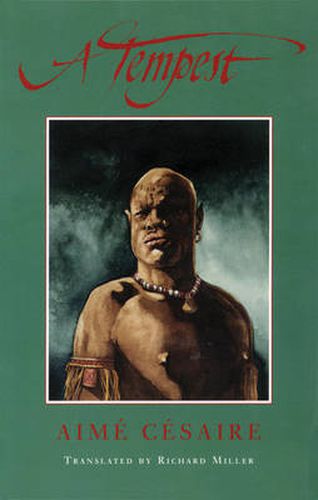Readings Newsletter
Become a Readings Member to make your shopping experience even easier.
Sign in or sign up for free!
You’re not far away from qualifying for FREE standard shipping within Australia
You’ve qualified for FREE standard shipping within Australia
The cart is loading…






Cesaire’s Tempest, in translation by Richard Miller, is a sprightly and song-filled enchantment. The luminous intelligence of Mr. Cesaire’s meditation on the absurdities of colonialism shines through the antics of the bewildered characters. -New York Times
The weapon of poetry may be Cesaire’s greatest gift to a modern world still searching for freedom. As one of the last truly great ‘universalists’ of the twentieth century, he has had a hand in shaping or critiquing many of the major ideologies and movements of the modern world. In his own words: ‘Poetic knowledge is born in the great silence of scientific knowledge.’ -from the Introduction Cesaire’s rich and insightful adaptation of The Tempest draws on contemporary Caribbean society, the African-American experience and African mythology to raise questions about colonialism, racism and their lasting effects. AIME CESAIRE was a world-renowned poet, essayist and dramatist, whose best known works include Notebook of a Return to My Native Land, The Tragedy of King Christophe and A Season in the Congo. He was the founding editor of Tropiques, which was instrumental in establishing the use of surrealism as a political weapon. He co-formulated the concept of negritude, which urges black Africans to reject assimilation and cultivate consciousness of their racial qualities and heritage. Cesaire held a number of government positions in his native Martinique, including that of mayor of Fort-de-France. Cesaire died in 2008. RICHARD MILLER has translated many books, both nonfiction and fiction, including works by Roland Barthes, Brassa? and Albert Camus, as well as poetry, many articles and a number of plays. Among his more recent translations are Scent by Annick Le Guerer and Beethoven’s Ninth by Esteban Buch, which was published in 2002. He lives in Paris.
$9.00 standard shipping within Australia
FREE standard shipping within Australia for orders over $100.00
Express & International shipping calculated at checkout
Cesaire’s Tempest, in translation by Richard Miller, is a sprightly and song-filled enchantment. The luminous intelligence of Mr. Cesaire’s meditation on the absurdities of colonialism shines through the antics of the bewildered characters. -New York Times
The weapon of poetry may be Cesaire’s greatest gift to a modern world still searching for freedom. As one of the last truly great ‘universalists’ of the twentieth century, he has had a hand in shaping or critiquing many of the major ideologies and movements of the modern world. In his own words: ‘Poetic knowledge is born in the great silence of scientific knowledge.’ -from the Introduction Cesaire’s rich and insightful adaptation of The Tempest draws on contemporary Caribbean society, the African-American experience and African mythology to raise questions about colonialism, racism and their lasting effects. AIME CESAIRE was a world-renowned poet, essayist and dramatist, whose best known works include Notebook of a Return to My Native Land, The Tragedy of King Christophe and A Season in the Congo. He was the founding editor of Tropiques, which was instrumental in establishing the use of surrealism as a political weapon. He co-formulated the concept of negritude, which urges black Africans to reject assimilation and cultivate consciousness of their racial qualities and heritage. Cesaire held a number of government positions in his native Martinique, including that of mayor of Fort-de-France. Cesaire died in 2008. RICHARD MILLER has translated many books, both nonfiction and fiction, including works by Roland Barthes, Brassa? and Albert Camus, as well as poetry, many articles and a number of plays. Among his more recent translations are Scent by Annick Le Guerer and Beethoven’s Ninth by Esteban Buch, which was published in 2002. He lives in Paris.